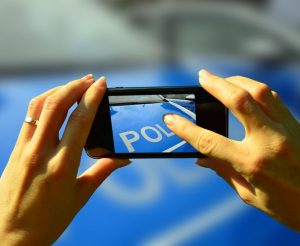 Recording police activity in a public space in Muskogee is generally legal. And with the advent of police shootings of members of the general public, many jurisdictions are now requiring that police officers wear body cameras in the performance of their duties.
Recording police activity in a public space in Muskogee is generally legal. And with the advent of police shootings of members of the general public, many jurisdictions are now requiring that police officers wear body cameras in the performance of their duties.
But body cameras are not required everywhere, and even in jurisdictions that require their use, there have been incidents in which the equipment has failed, or was never turned on in the first place.
But recording police activity can be against the law if it obstructs a police officer in the performance of his or her duties. So where does the line fall between lawfully recoding and obstructing?
Understanding What Obstruction of a Police Officer Is
Oklahoma law provides that any time a person willfully delays or obstructs a public officer in the performance of his or her duties, that person could be found guilty of a misdemeanor. Recording the activity of law enforcement in a public area is legal as long as the recording activity does not delay or obstruct the law enforcement agent in his or her duties. Okla. Stat. tit. 21 § 540
Recording police activity is generally a protected First Amendment right, as long as the recording is done on public property and there is no delay or interference with police in doing so. The tension arises when the police feel that the circumstances surrounding the recording delay or obstruct their ability to do their job.
How to Protect Yourself While Recording Police Activity
The more distance between you and the police officer you are filming, the better. Problems occur most often when you and the recording device — usually a smartphone — are in close proximity to the police officer.
Be careful about trying to shove your camera or phone in the face of an officer. The closer you are to the officer you are filming, the more likely that you could be found to be obstructing the officer in the performance of his or her duties.
So how much distance is enough? This is a question of fact that may depend on the circumstances. If you are filming a traffic stop, being in the car across the street or immediately in front of, or behind the car in question is probably fine. If you are filming a larger, more dangerous situation, such as a shoot-out or the like, you should be further away to allow the police more physical room to do their jobs.
So what about a more delicate situation? When the police demand that you stop recording and you continue to do so, is that obstruction? Probably not, unless you do something else to interfere with or delay the police.
Or what if the police order you to leave the area entirely and you refuse to do so and continue recording, is that obstruction? That could be. If you are ordered to disperse, you no longer have the legal right to be in that place. You must comply. But anywhere you are lawfully entitled to remain as a member of the public, you are almost always entitled to video record police activities.
Likewise, police may not confiscate or demand to view the recording without a warrant, and yet some do.
The Laws Are Different on Private Land
While we have a right to film what is in plain view on public property, those same rights do not apply on private property. On private property, the landowner may request that you not film, that you exit the property, or that you give him or her the video.
If you have been charged with interfering with or obstructing a police officer in the Muskogee area while filming police, contact a Muskogee criminal defense attorney to learn more about your options. If you have been harassed, or roughed up while video recording police activity or while protesting a police action, you might be entitled to civil relief.
Low-cost Consultation: Muskogee Defense Attorney
We are here to help you. The capable, experienced Muskogee criminal defense attorneys at the Wirth Law Office will carefully explain the process and alternatives you face, and are willing and able to explore all possible defenses and fight all out for you. Get the help you need.
Call an experienced Muskogee criminal offense attorney today at (918) 913-0725,. If you prefer, you can use the box in the upper right-hand corner of this page to send a brief question or message.








